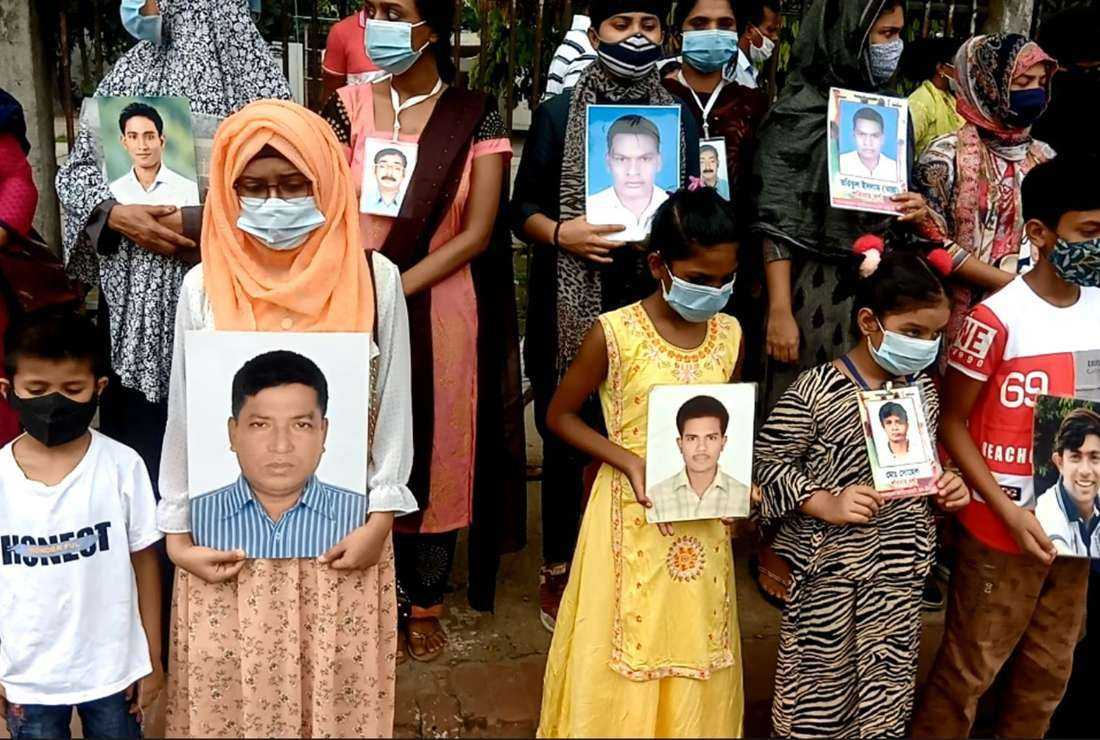Some 500 fell victim to enforced disappearance since 2013 and 200 still remain missing, rights group says

Family members of the victims of enforced disappearances demand justice during a rally in Bangladesh’s capital Dhaka in 2021. (Photo: Asian Forum Against Involuntary Disappearances)
Families of victims and rights activists have reiterated their demand for an impartial probe to ensure justice and punishment for perpetrators of hundreds of alleged enforced disappearances in Bangladesh.
They made the call while forming a human chain in front of the National Press Club in the capital Dhaka on May 27.
The event, organized by Mayer Daak (Mother’s Calling), a platform for the families of the victims of enforced disappearances, marked the International Week of the Disappeared, observed in the last week of May.
In the past decade, at least 200 people have disappeared, mostly after they were picked up by state agencies.
One of them is Chowdhury Alam, a member of the opposition Bangladesh Nationalist Party (BNP) and elected councilor of Dhaka City Corporation who disappeared on June 25, 2010.
His younger brother, Khorshed Alam, who joined the rally, demanded justice for the crime.
“I want to get my brother back”
Alam disappeared the year after the ruling Awami League came to power in 2009.
“Nearly 13 years ago my elder brother was picked up by the police and it was publicized in the media but law enforcement agencies continue to deny it,” Alam told UCA News.
“I want to get my brother back and for the government to find the culprits and bring them to justice,” he added.
Nur Khan Liton, executive director of the Dhaka-based rights group, Ain-O-Salish Kendra [Law and Arbitration Center], said the agency recorded 500 cases of enforced disappearances since 2013. Some 300 have been found and the whereabouts of the rest are still unknown.
In addition, about 100 bodies of persons allegedly killed in extrajudicial shootings have been found since then, according to the group.
The alleged extrajudicial killings triggered a heavy backlash from international rights groups and Western governments.
In December 2021, the US government imposed sanctions on the anti-terror force, Rapid Action Battalion (RAB), and its former and current top commanders for their involvement in extrajudicial killings.
Following the sanctions, Bangladesh has seen a drastic drop in extralegal killings and disappearances.
There were 25 extrajudicial killings in 2022 compared to 80 in the previous year, according to the US State Department’s human rights report in March.
“The government cannot escape the blame for its role”
Khan said that they have been calling on the government to form an independent commission to investigate the alleged killings and disappearances.
“We have demanded the government to form an independent commission to identify the agencies, officials, and individuals involved in the disappearances and ensure accountability for their roles,” Khan told UCA News.
“If the government allows a proper probe and pursues justice, it can prove it was not involved in these crimes. Otherwise, the government cannot escape the blame for its role in these disappearance cases,” he added.
Father Anthony Sen, convener of the Peace and Justice Commission of Dinajpur diocese, said the ball was in the government’s court.
“The government should take appropriate action subject to a proper investigation of all these incidents. Since the complaint is against the government, it must resolve the issue,” he told UCA news.
Human Rights Watch says despite the drop in extralegal killings and disappearances, state agencies continue to harass and abuse opposition leaders and members.
During a recent press briefing, Home Minister Asaduzzaman Khan said the government is looking at all disappearance and murder cases.
“It is not like we are looking separately here as BNP, Awami League, or Jatiya Party. The government is trying to uncover all,” Khan said.

